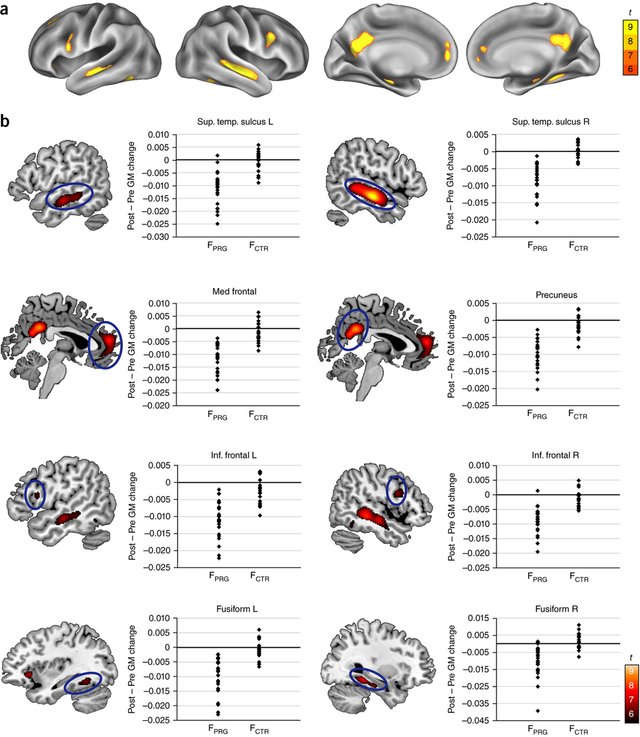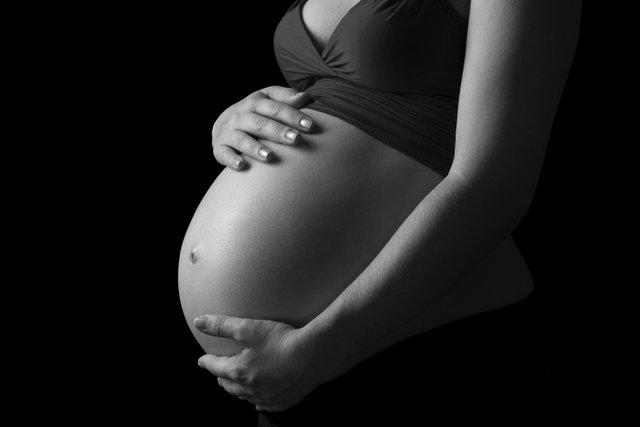Pregnancy Brain: Pregnancy May Lead To Long Lasting Changes in Brain Structure

Introduction
I would like to discuss a study in Nature Neuroscience by Hoekzema et al that I came across yesterday which seems to suggest some fascinating conclusions regarding a phenomenon know as "pregnancy brain".
I would like to present and discuss some of the main findings of this study and will endeavour to keep it brief.
If you are interested in the subject I would definitely recommend reading the paper which is available in full here:
http://www.nature.com/neuro/journal/vaop/ncurrent/full/nn.4458.html
Most people know that pregnancy induces substantial mental and physical changes in women. This new study suggests that pregnancy may also lead to structural brain changes.
Study Design

This was a prospective study which looked at women who had not previously given birth and were wanting to get pregnant.
The researchers then performed MRI scans before the women became pregnant and then followed up with further scans after their pregnancies were completed. These were then compared with control women who had not given birth and also compared with their pre-pregnancy scans.
There was also a comparison made with males who became parents pre and post pregnancy to see if any changes might actually be related to becoming a parent rather than pregnancy itself.
The final samples consisted of 25 primiparous (first time birth) women and 20 nulliparous (never given birth) control subjects.
Results
The volumes of Grey Matter showed statistically significant reductions in women after pregnancy compared to their pre-pregnancy scans and the control subjects.
The main areas involved were located in the anterior and posterior mid-line as illustrated in this beautiful graphic:

It is beyond the scope of this post to go into the detailed discussion of the specific neuroanatomy but the areas involved have been associated with social function.
The regions of GM change affected by pregnancy are known to play a role in social cognition, and a visual inspection of the observed GM volume changes suggested a strong similarity to the theory-of-mind network.
Although a reduction in grey matter may initially seem like a bad thing it may actually indicate an enhancement in brain function as a result of a process called pruning.
This is a process that occurs throughout childhood brain development and during adolescence. This is a streamlining process where un-necessary cells and connections are removed, resulting in faster and more efficient processing.
One analogy that I found useful to think of concerning pruning is imagining it to be like the etching of a silicon circuit board. Material may be lost but the actual end result is more capable and effective at a particular function than what you started with.
Cognitive Testing

Consistent with the "pruning" hypothesis there were no significant changes in the majority of cognitive tests performed:
We conducted several cognitive tests at the sessions before and after pregnancy. A verbal word list task was used to examine verbal memory, and changes in working memory were investigated using a backward digit span task and a two-back test. No significant changes were observed across sessions in these measures in comparison to the control group, although a trend was observed for a reduction in the number of correct responses on the verbal word list learning task
The one area of reduction is of interest although I wasn't able to find the raw data pertaining to this. It may indicate a change to working memory but I would need further information to comment properly. The way it is stated does not suggest that it is anything significant and it may be that follow up studies reveal this to be an anomaly.
Other points of interest

The researchers did a lot of different tests and there is a wealth of data in this paper which is really too much too cover in a post of this sort. There were some other things that stood out to me:
- Maternal attachment scale scores were strongly associated with the changes in GM volume. To put it simply the greater the changes the greater the attachment between mother and infant.
- Long term follow up (e.g. 2 years) in 11 of the women showed the changes were mostly enduring.
- No similar effects were seen in males who became first time parents.
Potential Problems

Having peripherally taken part in studies of this sort at University I understand a lot of the problems that they have. Most of these relate to the large costs, time and immense amounts of data involved.
These all confer certain limitations:
- Sample sizes were quite small (i.e. 25 subjects vs 20 controls) - by the nature of such a study it is incredibly expensive and time intensive so this is understandable.
- Recruitment was via one specific location in Barcelona. Is this a location specific effect, e.g. one population group, something environmental etc.?
- 16 of the 25 women underwent fertility treatment to become pregnant - does the fertility treatment itself lead to an exaggerated or spurious result? The paper takes this into consideration and it seems that the changes are quite consistent across these subgroups.
- Are the changes related to pregnancy itself or due to some other intervention that occurs in pregnancy - e.g. related conditions, type of delivery, anaesthesia etc.?
- Is there another confounding factor like pre-existing mental illness which may alter GM volume?
- Is the reduction in one of the cognitive tests an anomalous finding in this particular study?
To be fair the study does take most of these factors into consideration, through testing, exclusion criteria and further data analysis.
You can see how they do this in the Methods section if you would like to make your mind up about how effective they are.
I think they do a decent job overall although no study is perfect.
I think the most important thing (as always) is to see if these results can be duplicated in further studies done at different times and in different locations. It would also be interesting to look at the effect of subsequent pregnancies on brain volume - does this lead to further changes?
Conclusion

This is a very interesting study which suggests that women's brains may undergo remodelling in specific regions related to socialisation during their first pregnancy.
This has some parallels to the brain pruning that occurs during adolescence and appears to be consistent with enhancement of social functioning in areas related to maternal-infant attachment.
This gives strength to the idea of "Pregnancy Brain". As always further research is needed to confirm and strengthen the validity of these findings. It would also be interesting to study the effects of subsequent pregnancies on the maternal brain.
I hope I have struck the right balance between brevity and avoiding rehashing too much of the original article. Please let me know what you think in the comments.
Reference:
Hoekzema, Elseline, Erika Barba-Müller, Cristina Pozzobon, Marisol Picado, Florencio Lucco, David García-García, Juan Carlos Soliva, et al. 2016. “Pregnancy Leads to Long-Lasting Changes in Human Brain Structure.” Nature Neuroscience, December. doi:10.1038/nn.4458.
Online link: http://www.nature.com/neuro/journal/vaop/ncurrent/full/nn.4458.html
Thank you for reading.

A bit about me
As some of you know I have had some recurrent health issues over the last decade which have interrupted my career and made me re-evaluate my life. I am medically trained and looking to get back to work as my health allows.
Thanks to a suggestion by @andrarchy I would like to do more medically oriented articles when I have time both to contribute to the community using my skills and to help keep my critical analysis and medical thinking skills fresh.
If you like my work please follow me and check out my blog - @thecryptofiend
All uncredited photos are taken from my personal Thinkstock Photography account. More information can be provided on request.
Are you new to Steemit and Looking for Answers? - Try https://www.steemithelp.net.

This post has been ranked within the top 80 most undervalued posts in the second half of Dec 22. We estimate that this post is undervalued by $5.06 as compared to a scenario in which every voter had an equal say.
See the full rankings and details in The Daily Tribune: Dec 22 - Part II. You can also read about some of our methodology, data analysis and technical details in our initial post.
If you are the author and would prefer not to receive these comments, simply reply "Stop" to this comment.
upvoted.
Thank you:)
You're most welcome.
Oh man, I didn't know you had medical issues. I really hope you get as strong as humanly possible.
It gives you a perspective in life, that's for sure. But I hope you get very healthy so you can do every thing you want.
I wish you well my friend! All the best!
Thanks mate. I'm much better now although I have to take insulin now because my pancreas died so it's a bit of a hassle. Merry Christmas!
Really well done post, and an interesting topic. I wonder what it is that causes these changes. Hormonal signaling during pregnancy? Is there a particular stage during pregnancy in which these changes begin? Does it correlate to a particular development state of the fetus?
Those are great questions. The authors hypothesise that these are hormonally mediated changes and use the model of puberty as an analogy - obviously it is not exactly the same. There are likely hormones produced by the fetus itself but it needs further study. As for timing their methodology would suggest that the changes occur after the first trimester but it needs further research due to the limitations here. They used their cut off for nulliparity as being no pregnancy that progressed beyond the first trimester.
[Join us on #steemSTEM]
Very nice and detailed summary of this publication of Hoekzema and collaborators. We thank you for sharing, in layman's terms, both the strength and the weaknesses of this study on the pregnancy brain with the Steemit community. To answer your last question: you definitely achieved the right balance between brevity and avoiding rehashing too much of the original article!
As a bonus, and in addition to resteeming for exposure. We are awarding you a small 10 Steem Power deposit as a thank you for creating quality STEM related postings on Steemit. We hope you will continue to educate us all!
Thank you that is so kind:)
I didn't know about that at all before reading your post. I agree with your personal conclusions. The good question is indeed what would be left with a larger sample with individuals originating from varied locations. I hope the researchers will find the funding to extend the study!
Thanks. Yes this is just a starting point I think. Hopefully we will get more repetition.
It is funny that with the girls we have just discussed it. That is absolutely true. And some husbands are kidding that women leave brains in the hospital after they had a child. And I noticed it by myself. I had much better memory before and now I need to write down many things.
Interesting. Thank you for sharing your insights:)
Nice job. I saw it a few days ago but didn't do a post on it. Glad you did.
Thanks. I wasn't sure if it was too brief or not.
Very good article 👍
Thank you:)
I wonder what happens to the pregnancy brain when an abortion occurs?
these changes likely require being pregnant late term.
Have you ever lived with a pregnant woman?
changes in mood and personality dont necessarily mean brain changes
The volumes of Grey Matter showed statistically significant reductions in women after pregnancy compared to their pre-pregnancy scans and the control subjects.
The main areas involved were located in the anterior and posterior mid-line
apparently they do.
kinda like interrupting a computer during boot cycle and wipeing some of the data off the hard drive..
I think the hormone changes are most likely effecting what people experience as 'pregnant woman behaviour' But what I meant was simply the logic that living with a pregnant woman isn't a scientific study. I don't see where they say the brain change responsible for giving women particular symptoms throughout pregnancy. rather that it is perhaps a type of preparation for motherhood. which is just a hypothesis. theyve only found the changes, they cant say why it exists for certain
_you think_and yet...you still haven't read the article....?
the truth must be a scary thing.
The study used the first trimester as being the cut off for nulliparity (never having given birth) - I don't think they recorded how many women had actually had any previous miscarriages or terminations that fit into this category. I think more detailed research would be needed to determine that.
it could be impossible to know for sure if a womans had a miscarriage, if she's never knowingly been pregnant. could be a hard thing to study. So women wo didnt actually become mothers were used in this one? it's confusing!
Yes they used the first trimester as cut off. You can't really have a miscarriage after that without knowing is perhaps the reasoning.
Hard to say.